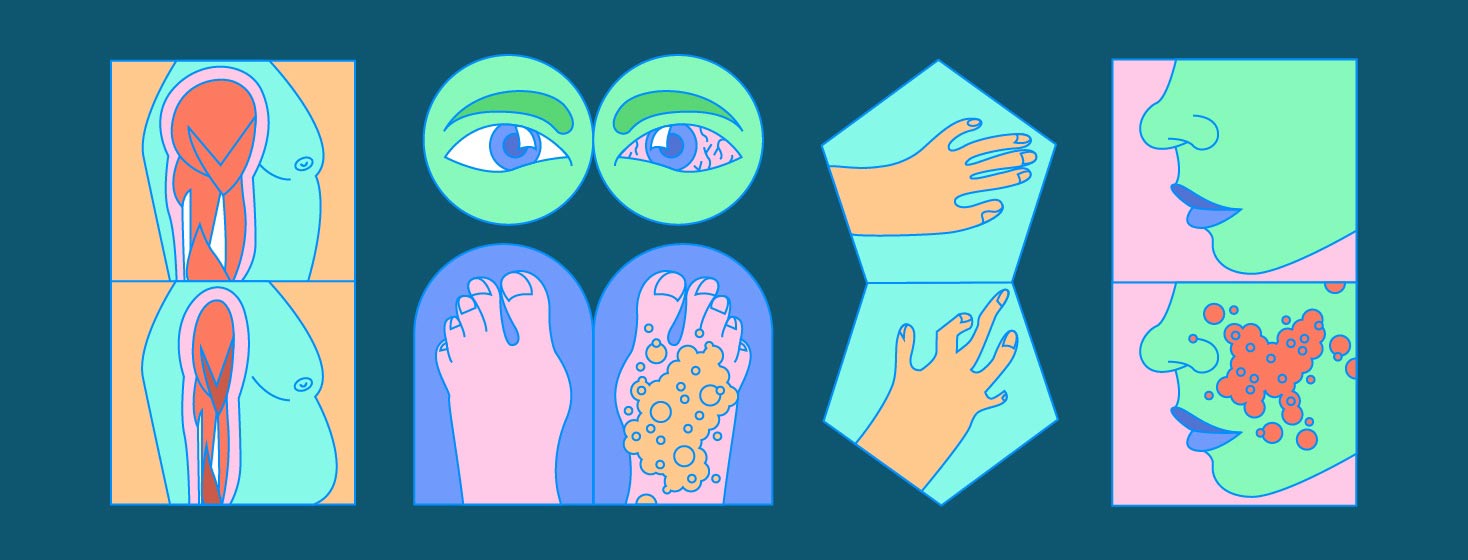Autoimmune Diseases Connected to Hepatitis C
There are a variety of autoimmune diseases associated with hepatitis C. Autoimmune diseases are where a person’s own immune antibodies attack the bodies tissue and organs.
Mixed cryoglobulinemia
Mixed Cryoglobulinemia is the most common autoimmune disease associated with hepatitis C. Cryoglobulinemia occurs when abnormal proteins in the blood clump together and cause blood to thicken in lower temperatures. These jellylike protein clumps hinder blood flow and can damage various organs like skin and nerves, while also doing damage to your liver and kidneys.
Cryoglobulinemia is also referred to as a type of vasculitis (enlargement of the blood vessels). The most common symptoms of cryoglobulinemia may include purple spots or blotchy areas on the legs, joint and muscle pain, and numbness/tingling in the fingers and toes.1,2
Sicca Syndrome
Sicca syndrome refers to an autoimmune disease known as Sjogren syndrome. This causes dry eyes and dry mouth. With Sjogren syndrome, the body’s immune system attacks its own healthy cells that produce saliva and tears. It is common to occur with other autoimmune disease like rheumatoid arthritis and lupus.3
Lupus
A study reported by the Journal Immunologic Research shows that lupus patients have a high occurrence of hepatitis C. The study shows there is a link to hepatitis C and autoimmune diseases like lupus.4
Lupus is a chronic autoimmune disease causing inflammation, swelling, joint pain, headaches, hair loss, fatigue and anemia. A skin type rash can appear across the patient's face around the cheeks and nose area.
Lupus can affect different parts of the body like the heart, digestive organs, or areas of the skin. According the Lupus Foundation of America, there are four types of lupus, the most common form of lupus is referred to as systemic lupus erythematosus (SLE) which can range from mild to severe.5
Scleroderma
Scleroderma is a chronic, rheumatic autoimmune disease that affects the body by hardening the connective tissue.
Scleroderma means hardening of the skin. Symptoms can include joint pain, tightening of the skin, sensitivity to cold (Raynaud’s disease), and heartburn.
The hepatitis C virus is also associated with a variety of skin disorders such as porphyria cutanea tarda, lichen planus, erythema nodosum, and erythema multiforme.
Polymyositis
Polymyositis is another autoimmune disease associated with the hepatitis C virus. It is a type of inflammatory myopathy (disorder of the skeletal muscles). This can cause chronic inflammation of the muscles and blood vessels resulting in muscle weakness.6
Testing for autoimmune disease associated with hepatitis C is recommended prior to starting treatment for hepatitis C. Talk to your doctor about any symptoms you have. Medications for autoimmune conditions can help relieve symptoms. All medications you’re taking need to be considered prior to selecting the right hepatitis C treatment best suited for you.

Join the conversation